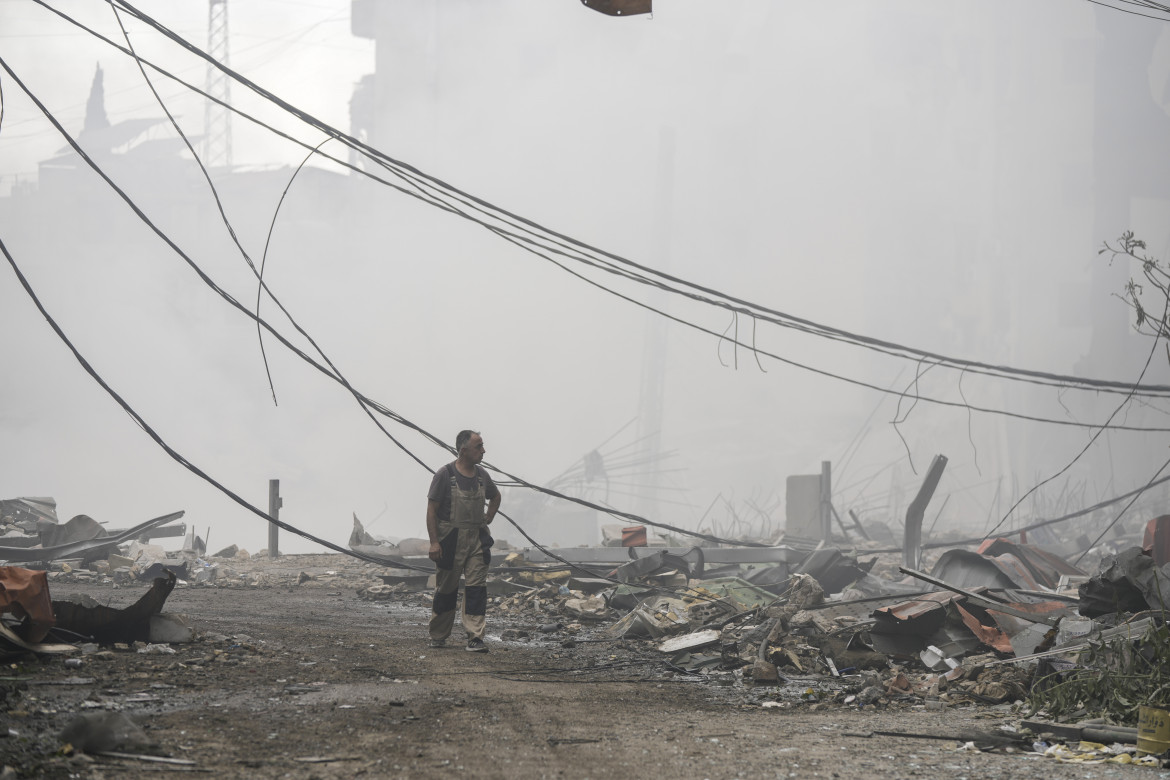Reportage
A year since the Hamas attack, Israel is expanding its war path throughout the Middle East
‘Is it normal that our children are in danger of dying at any moment?’ Airstrikes continue in southern Beirut. On Monday afternoon, the neighborhoods of Burj el Barajneh, Roueis, Laylakeh and Mrejeh, very close to the airport, were hit again.

A swing between two pines cordoned off with red and white tape is the first thing we see in this clearing among the hills of Kayfoun, in the Mount Lebanon area, 15 minutes from Beirut. A little further on, at the entrance to the bombed-out building, two pedal cars are piled one on top of the other, dusty and grimy.
“Children used to play here, down at the building. Is it normal for things to be this way? Is it normal that our children are in danger of dying at any moment?” says one of the men we meet, as he urges us to put on masks because he believes Israel used white phosphorus, like in many other air raids. In another airstrike in the area, in Souq el Gharb, a local Hezbollah member was killed together with his wife and three little girls. Everywhere it’s the same story.
The apartment targeted was on the fourth floor. The official death toll is six, with 13 injured, according to the latest figures from the Ministry of Health. “There was no one from the party. They’re hitting civilians,” people say in the square, which features the photo of General Fuad Shukr, Hezbollah's number two, who was killed in an airstrike in south Beirut on July 30.
This week, schools will be able to resume classes remotely, but only for the earliest grades. For the teenagers and the displaced youth, there is still no plan to allow them access to education.
Airstrikes continue in southern Beirut. On Monday afternoon, the neighborhoods of Burj el Barajneh, Roueis, Laylakeh and Mrejeh, very close to the airport, were hit again. In the evening, loud explosions were heard throughout the city from airstrikes in Chiyah, close to the Christian areas which have been untouched by the bombs so far. In Mount Lebanon, South Lebanon, Saida, Beka'a, Baalbeck-Hermel, airstrikes are intense and continuous. The Israeli army has closed off access to Rosh Hanikra, Shlomi, Hanita, Adamit and Arab al-Aramshe on the northern border, declaring them “military zones.”
Ten on-duty firefighters died in an Israeli airstrike in Beraachitsul, which hit the headquarters of the fire station serving the municipalities of Bint Jbeil in the south. Meanwhile, Hezbollah fired 140 rockets at Israel, and in the evening claimed that it successfully hit Haifa once again.
During his visit to Beirut on Monday, Jordan’s chief diplomat Ayman Safadi accused “the Israeli aggression ... which started in Gaza and now has continued into Lebanon,” which “is pushing the whole region into the abyss of full-blown regional war.”
The war in Lebanon began exactly one year ago, the day after the Hamas attack. The total number of casualties so far is 2,083, while the number of wounded is 9,869, according to figures provided by the Lebanese Ministry of Health. The number of the internally displaced has exceeded 1 million. 400,000 Syrians (and some Lebanese) have returned to Syria. On September 23, the Syrian government issued a general amnesty for those who had evaded the draft, which made it easier for some to return.
Others have avoided the Lebanese border as they have no legal status in Lebanon, and arrived at the Syrian border via back roads.
There are many interests at play in this war, and they are beginning to emerge. Israeli Energy Minister Eli Cohen called for the repeal of the gas field agreement with Lebanon, calling it “a mistake.” He wrote on X that “Israel is looking for a loophole to cancel the scandalous gas agreement with Lebanon.” In late 2022, Lebanon and Israel signed a maritime border agreement after two years of indirect negotiations brokered by the United States. The dispute concerned an 860-square-kilometer marine area rich in oil and natural gas. After the agreement, several international companies (including Total) began exploring the Lebanese seabed.
On the internal front, the absence of a president is taking its toll in Lebanon. On Monday, Sleiman Frangieh, head of the Christian Marada party and a possible candidate, met with Nabih Berri, head of Amal (Lebanon's other Shiite party), who holds the third-highest office in the state as president of Parliament. However, Frangieh is persona non grata among the Christian right: Marada has always held positions aligned with Hezbollah. Getting a new president in office will be a very difficult task: the role has remained vacant for two years after the end of the term of Michel Aoun, a historic ally of Hezbollah. Since then, the already high tensions between the two biggest blocs have risen and are in danger of escalating further.
Originally published at https://ilmanifesto.it/non-cera-nessuno-del-partito-di-dio-colpiscono-solo-civili on 2024-10-08
